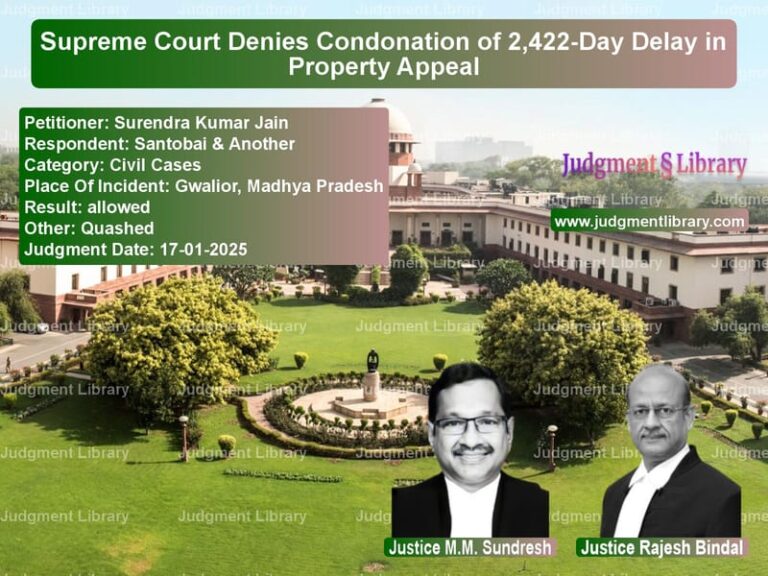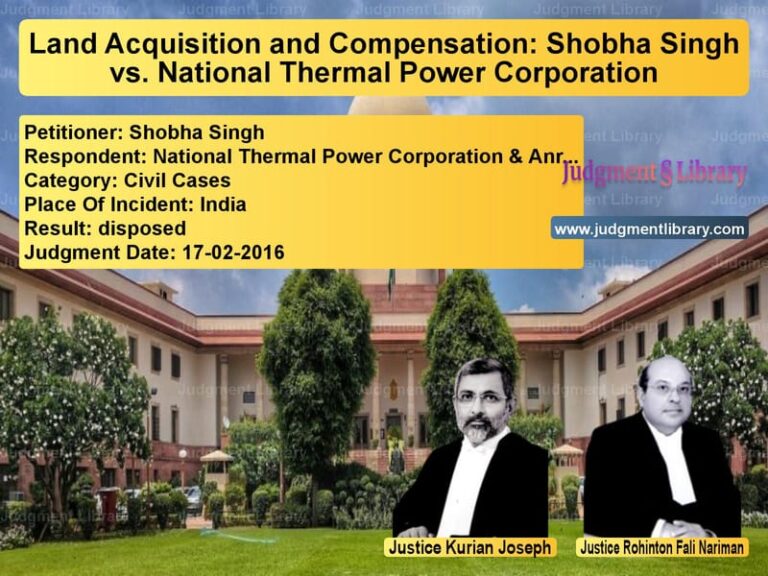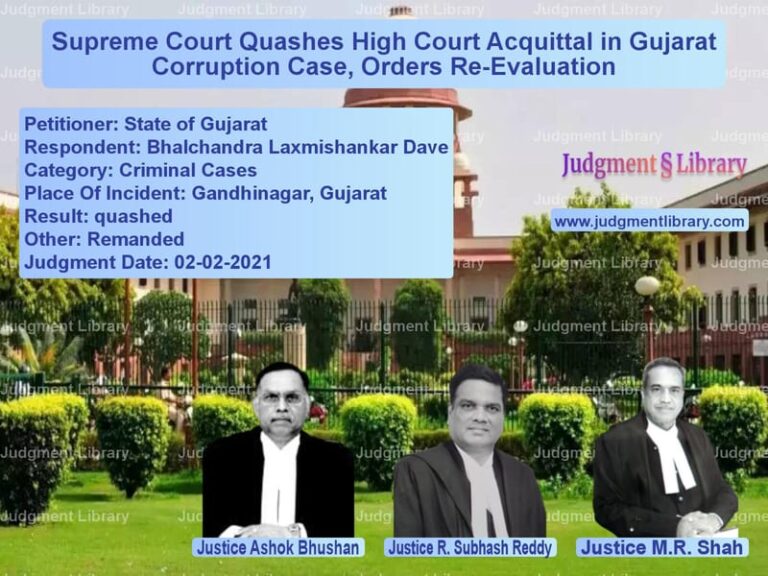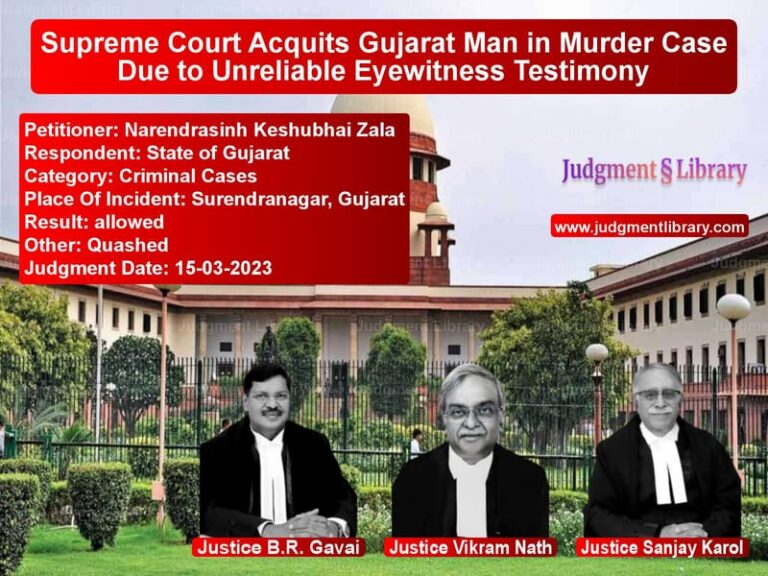Withdrawal of Civil Appeal: Supreme Court Dismisses DSM Nutritional Products Ltd. v. Union of India as Infructuous
The Supreme Court of India, in the case of M/s DSM Nutritional Products Ltd. v. Union of India & Ors., dismissed a civil appeal after the appellant’s counsel informed the Court that the issues raised had become academic in nature. The case, listed as Civil Appeal No. 6352 of 2012, was formally withdrawn on October 20, 2021, following an application by the appellant. This ruling provides insight into the procedural aspects of appeal withdrawals and highlights the importance of judicial efficiency in disposing of cases that no longer require adjudication.
Background of the Case
The appellant, M/s DSM Nutritional Products Ltd., had initially approached the Supreme Court to challenge certain regulatory or administrative decisions made by the Union of India. The specifics of the original dispute remain undisclosed in the Court’s final order, but the case had been pending before the Supreme Court for nearly a decade.
During the course of litigation, the circumstances that had led to the filing of the appeal changed, rendering the matter unnecessary for further judicial intervention. Consequently, the appellant’s legal representatives, led by Ms. Praveena Gautam, decided to file an application seeking withdrawal of the appeal, stating that the legal questions involved had become academic.
Legal Issues Considered
Although the Supreme Court did not delve into the substantive legal issues originally raised in the appeal, the ruling touches upon several key procedural aspects:
- Whether an appeal can be withdrawn when the issues have become academic.
- What procedural steps must be followed for an appeal’s withdrawal in the Supreme Court.
- Whether courts should entertain cases that no longer have a live controversy requiring adjudication.
Petitioner’s (DSM Nutritional Products Ltd.) Arguments
The appellant’s counsel, Ms. Praveena Gautam, submitted the following arguments before the Supreme Court:
- The issues raised in the appeal had lost their legal significance and no longer required a ruling.
- The circumstances that led to the appeal had changed over time, making any further deliberation by the Court unnecessary.
- It was in the interest of judicial efficiency to allow the withdrawal rather than continuing proceedings on a matter that was no longer relevant.
- An official application had been filed requesting withdrawal, in compliance with Supreme Court procedural norms.
Respondent’s (Union of India) Arguments
The respondents, represented by the Union of India, did not oppose the withdrawal and acknowledged that no further judicial intervention was required. The lack of opposition from the respondents suggests that they, too, recognized the redundancy of continuing the appeal.
Supreme Court’s Observations
After considering the submissions made by both parties, the Supreme Court noted:
“Submission of the learned counsel for the appellant is placed on record. The appeal is dismissed as withdrawn. Application is accordingly disposed of.”
This brief but critical ruling underscores the Court’s approach in handling cases that have lost their practical relevance. The judgment aligns with previous decisions where the Supreme Court has permitted withdrawal of appeals that had become infructuous over time.
Judicial Efficiency and the Concept of Academic Cases
The concept of an academic case in legal jurisprudence refers to situations where the dispute no longer presents a live controversy requiring judicial determination. Courts across the world, including the Supreme Court of India, refrain from adjudicating academic matters unless there are exceptional circumstances warranting a ruling.
In this case, the Court adhered to the principle that judicial resources should not be expended on cases that do not present a continuing legal issue affecting the parties involved. The ruling reinforces the following procedural guidelines:
- Parties have the right to withdraw appeals when the issues raised no longer require resolution.
- The Supreme Court does not entertain academic matters unless they involve a substantial question of law with wider implications.
- Applications for withdrawal must be formally submitted and recorded by the Court before an appeal can be dismissed.
Precedents and Legal Principles
The Supreme Court’s decision in this case aligns with several past rulings where appeals were dismissed as infructuous due to changed circumstances:
- Rameshwar Prasad v. Union of India (2006): The Court held that an appeal must present a continuing controversy to warrant adjudication.
- Rajesh Kumar v. State of Bihar (2019): Reinforced the principle that courts should not engage in academic adjudication.
- Poonam v. Suresh (2020): Emphasized that judicial efficiency demands the dismissal of appeals that no longer serve a purpose.
Final Judgment
The Supreme Court ruled:
- The appeal was dismissed as withdrawn.
- The Court formally recorded the submission made by the appellant’s counsel.
- No adverse orders were passed against either party.
Significance of the Judgment
This ruling has significant implications for legal proceedings in India:
- Reinforces the principle of judicial efficiency: Ensures that the Court’s time is dedicated to resolving disputes that have a tangible impact.
- Affirms the right to withdraw appeals: Allows parties to discontinue litigation when it no longer serves their interests.
- Clarifies procedural requirements: Demonstrates that formal applications must be submitted for an appeal to be withdrawn.
- Prevents unnecessary litigation: Ensures that cases do not remain pending indefinitely when they have lost their relevance.
Conclusion
The Supreme Court’s decision in M/s DSM Nutritional Products Ltd. v. Union of India & Ors. reiterates the principle that appeals that have lost their relevance can be withdrawn without requiring substantive adjudication. This ruling ensures that judicial resources remain focused on matters that need legal determination.
Petitioner Name: M/s DSM Nutritional Products Ltd..Respondent Name: Union of India & Ors..Judgment By: Justice B.V. Nagarathna.Place Of Incident: New Delhi.Judgment Date: 20-10-2021.
Don’t miss out on the full details! Download the complete judgment in PDF format below and gain valuable insights instantly!
Download Judgment: ms-dsm-nutritional-vs-union-of-india-&-ors-supreme-court-of-india-judgment-dated-20-10-2021.pdf
Directly Download Judgment: Directly download this Judgment
See all petitions in Other Cases
See all petitions in Judgment by B.V. Nagarathna
See all petitions in dismissed
See all petitions in Declared Infructuous
See all petitions in supreme court of India judgments October 2021
See all petitions in 2021 judgments
See all posts in Civil Cases Category
See all allowed petitions in Civil Cases Category
See all Dismissed petitions in Civil Cases Category
See all partially allowed petitions in Civil Cases Category







